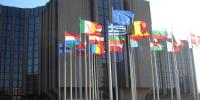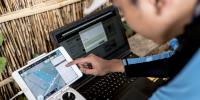Background
Goals
Methods
- A trend analysis of significant current and emergent developments along the ten themes;
- A SWOT (strengths, weaknesses, opportunities and threats) analysis from the perspective of European innovation system stakeholders in the context of societal grand challenges; and
- Scenario development, taking into account the critical uncertainties and policy implications associated with these themes.
Scenarios
- ‘Easy riders’ – after a painful period of economic recovery, the world attains steady growth and progresses towards societal objectives. Helping to feed this growth are digital enhancements and a vibrant set of new, agile companies and business models.
- ‘Stately procession’ – economic growth is maintained, but the development of business and societal ecosystems has slowed to a crawl, ruled by large, powerful and stable organisations that produce a steady stream of modest advances in the most critical areas.
- ‘Riders on the storm’ – the hoped-for recovery has faltered and a succession of crises has seen power returned to contending countries and increasing fragmentation and protectionism and the emergence of new networks based more on shared interest than national identity.
- ‘Riding the waves’ – the emerging economies have been slowly overtaking today’s major powers, and inequality has declined. The economic shocks of 2007–2008 have given way to problems involving rare earths, terrorist states and climate change, strengthening international cooperation.
Findings
- Social, legal and policy implications of technology need to be integrated into technology research programmes
- Inflexibilities in the legal and policy environment create barriers for the uptake of research outputs and must be addressed
- It is important to consider whether traditional innovation support mechanisms are likely to engage key players in particular areas. E.g. Do-It-Yourself innovation is tightly linked to the sharing economy, but the sharing economy is disaggregated and likely to be dominated by actors other than traditional firms. Failing to find ways to engage these actors could result in the loss of their contributions.
Publication
Project Team
Jonathan Cave
Salil Gunashekar
Veronika Horvath
Catherine Lichten
Enora Robin
Sonia Sousa
Nicole Van der Meulen



















